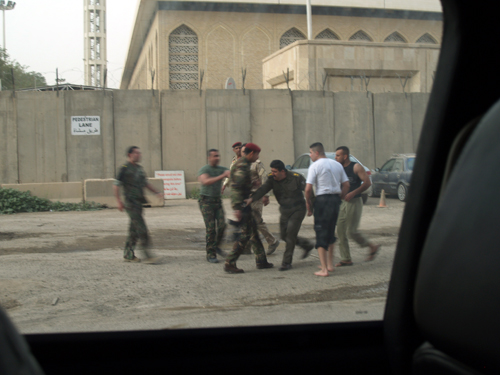
Policing the International Zone

Iraqi soldiers scuffle amongst themselves on the street in Baghdad. (Dimiter Kenarov)
Pickup trucks, SUVs, military trucks, Humvees, fire trucks, ambulances. Honking. Singing. It all looks like a big tailgate party. “If we were in America, there’d be shitloads of beer,” observes Dave Lee, a US Airman and now a cop with the International Zone Police in Baghdad, as we slowly drive past the commotion. It is the 4th of March, sunny, high 60s. Today all Iraqi Security Forces—army, police, and emergency personnel—are scheduled to cast ballots, a few days ahead of the official elections, when their job will be securing other people’s right to vote.
There is only one polling site in the International Zone, located in the so-called 215 Apartments, but access to that area is highly restricted, even for the IZ Police. “Normally, it shouldn’t be a problem to get in, it’s all part of the International Zone, but the IA [Iraqi Army] wouldn’t allow us that. They like to show who’s in charge now,” Matt Farr, another IZ cop, tells me.
Ever since the Security Agreement transferred official responsibilities to the Iraqi government, the IZ Police don’t have much authority. Staffed by US Army Military Police and Air Force Security Forces, they try to keep a low profile, as all other US agencies in Iraq tend to do nowadays. Their motor pool is now reduced to a few black armored SUVs and eighteen people. The occasional traffic accident is the most exciting part of most days.
Today is no different. First, two Peruvians, working as security guards for Triple Canopy, are detained by the Iraqi Army for taking pictures of the street gathering, and the IZ Police have to negotiate their release. Next, someone finds an old rusty EFP (Explosively Formed Penetrator) by the Monument to the Unknown Soldier, and the IZ Police arrive on scene to secure the area. Later, a traffic accident involving an Iraqi Army lieutenant and a KBR worker escalates into a bureaucratic nightmare.
Then a voice comes crackling over the radio. “Small-arms fire near LZ Washington! Small-arms fire near LZ Washington!” And we’re off. Today will not be like any other day. Lee and Farr are ecstatic. Lee cranks up the stereo: “The Meaning of Life” by heavy metal band Disturbed. Farr steps on the gas pedal, indifferent to the speed bumps on the road. My head knocks hard against the ceiling. In a few minutes we are at the scene, body armor and Kevlars on, their M4s on red. We are the first responders, and we have no backup. We stay in the car for a few minutes to assess the situation. Next to the hideous, half-ruined Blackhawk palace, in front of the compound for Blackwater (now Xe), a crowd of IA troops brandishes rifles and turret gunners on top of their Humvees nervously scan the area with their .50 caliber machine guns. All of a sudden, two Iraqi soldiers break out of the crowd, running and shouting, one of them reaching out to grab the other’s AK. It takes us some time to realize what is happening. Iraqi Army units are fighting each other. The tailgate party has ended in a brawl.
Our backup arrives and we cautiously step out of the car. “Keep your safety on,” Lee tells Farr. The firefight is obviously over, but tensions are still running high. One of the interpreters, codenamed Snake, goes out to the Iraqis to find out what is going on, while we advance by the T-wall. A minute later he comes back with the scoop: a car accident involving two vehicles; heated words; an exchange of fire. The counterterrorism unit vs. another army unit. This is the new Iraqi Army.
Later in the afternoon, while we are resting by the Hands of Victory, the famous crossed-sabers monument in Baghdad, another IZ cop named Sergeant Mariani says, “There was no reason for us to get out of the cars.” He is still seething, pissed that American troops could have been caught in the middle of a dispute between Iraqi soldiers. “Let them kill each other,” he says. “Why should we get involved?”
Dimiter Kenarov is in Baghdad with a grant from the Pulitzer Center on Crisis Reporting. Learn more about this project on the Pulitzer website.

